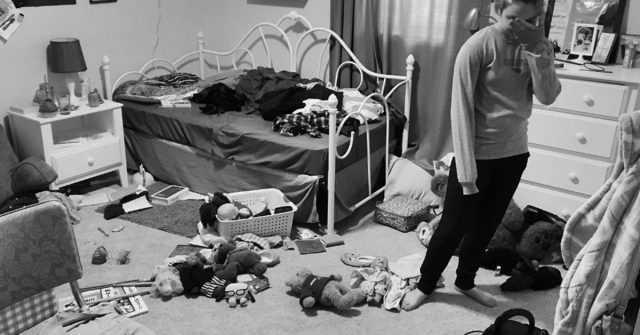Imagine coming home after a hard day at work, opening your front door, and the first thing you notice is that the whole place is a total mess.
The kids have left piles of clothes and toys on the floor, the kitchen sink is chock-full of dirty dishes, the table has half eaten sandwiches and a spilt drink… for most people, they immediately feel stress and anxiety as they know that they will be the ones that have to clean everything up, and will be spending their precious few hours of leisure time continuing to work, instead of relaxing.
Psychologists say that cluttered space is a trigger of stress and anxiety.
Rarely is clutter recognized as a significant source of stress in our lives. Psychologist Sherrie Bourg Carter explains that; “Clutter can play a significant role in how we feel about our homes, our workplaces, and ourselves. Messy homes and workspaces leave us feeling anxious, helpless, and overwhelmed. Yet, rarely is clutter recognized as a significant source of stress in our lives.”
Why does clutter lead to so much stress?
According to Carter, there are 8 specific reasons:
- Clutter serves as excessive visual, olfactory and tactile stimuli, causing our senses to work overtime by focusing on items that are unimportant in that moment.
- Clutter can distract our minds away from what we are trying to focus on.
- Messes make it more difficult for us to relax mentally, emotionally and physically.
- Clutter signals to our brains that our work is not finished, keeping us from resting.
- Anxiety can set in when viewing clutter as we’re not sure how much more effort it will take to eventually get it all cleaned up.
- Clutter can make us feel guilty for not being “more organized,” and also embarrassed, especially when someone pays us an unexpected visit at home or at work.
- Clutter inhibits creativity and productivity by draining valuable energy and focus away from our quiet times of reflection and problem solving.
- Clutter can lead to frustration when we are unable to find items that we need quickly due to the mess.
Thankfully, clutter is one of the simplest stressors to fix! According to Carter, the methods listed below are very effective in de-cluttering your home and thereby releasing your mind from the associated stress and anxiety:
1. Get The Family To Help
If your house has a large amount of clutter, don’t try to fix everything by yourself. Instead, get the whole family involved in making your home a stress-free environment.
Start by choosing a room that everyone uses and assign each person a certain area of the room to de-clutter. Once this first room is tidied up, move on to the next room, and enjoy a sense of accomplishment after each room becomes organized.
2. Create Places For Frequently Used Items
We can prevent clutter by creating specific areas, such as drawers and cabinets, for the items that are frequently used. This allows you to know where these important daily items are and lets you find them quickly and easily; eliminating the previous stress of searching for them.
Resist the urge to “store” things on open shelves or on top of furniture in open and visible places, as this will not remove them as visible stimuli which further adds to stress.
3. Get Rid Of Things You Don’t Use
If you don’t use it, then recycle it or give it to charity. Keeping things that you don’t need or use in visible sight will only add to stress levels. If you use it rarely and want to keep it, then consider storing it in a well-labeled box in the garage. This method helps your home to have more open space, which in turn allows your mind to relax more.
4. Put Things Back After Using Them
An important habit to develop for families is to always put things back into their designated spaces immediately after having finished using them. This may sound simple, but not everyone does it, and it’s a very effective method for keeping a home free from stressful clutter.
5. Make A Pending Folder
A pending folder is a place to put all of the papers and documents of projects that you’re working on; allowing you to free up and clear space on your desk as well as making it easier to find the documents you need. When you’re ready to revisit a document, simply open the folder and then put that specific piece of paper on your desk.
6. Don’t Let Papers Pile Up
Back to the idea that clutter represents unfinished and stressful work that needs to be done, make sure to quickly clean up and organize any heaps of papers laying around your house. This includes mail, flyers, homework, newspapers, etc. Go through everything as soon as you can, and organize them appropriately.
7. Tidy Up Your Workspace Before You Leave It
After you’ve finished working, make sure to de-clutter your primary work space. This habit will leave you feeling accomplished and satisfied after a good day’s work. I think you’ll agree, it also makes you feel good when you return to a clean work space the next day.
8. Make It Fun!
The key to maintaining a de-cluttered home or office is in keeping the motivation it requires to follow these methods. Make de-cluttering fun by listening to your favorite music while getting things in order. It not only lifts your spirits, but it can also make the time pass faster, and then voilà! Your home has been de-cluttered and everyone’s stress and anxiety levels are sure to decrease.
Have you noticed that clutter causes you stress?
Let us know in the comments.
You are Loved.
See Also: Study Shows That Clutter Causes Anxiety; Removing These 20 Items Will Instantly Improve Your Mood


















